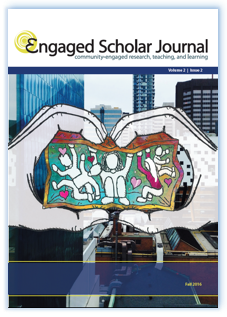Leadership in Community-Based Participatory Research: Individual to Collective
DOI:
https://doi.org/10.15402/esj.v2i2.162Keywords:
community-based participatory research, leadership, partnership, multi-sectorAbstract
Multi-sector collaborative partnerships hold much promise in tackling seemingly intractable and complex social issues. However, they often encounter many challenges in achieving their goals. Leadership can play an important role in reducing the impact of factors that threaten a multi-sector partnership’s success. Community-based participatory research (CBPR) partnerships are collaborative and, in many cases, multi-sectored. While there is a developing literature and practice on multi-sector, collaborative partnerships, leadership in CBPR is relatively unexplored, especially at various partnership stages (i.e., formation, implementation, maintenance, and accomplishment of goal). Through the method of focused ethnography, we explored the research question “How is leadership exercised during the formation stage of a CBPR partnership?” Eighteen partners (government, community, and university sectors) were interviewed about the leadership during the formation stage of their partnership, and data were qualitatively content-analyzed. Partners explained that leadership was exercised during the formation stage through (1) individual characteristics, (2) actions, and (3) as a collective. Our findings illustrate that CBPR leadership shares many of the characteristics of traditional leadership and adapts them to support the collaborative process of CBPR, leading to a collective form of leadership. These findings have implications for the study and practice of CBPR leadership.
Downloads
Published
How to Cite
Issue
Section
License
Authors who publish with this journal agree to the following terms:
- Authors retain copyright and grant the journal right of first publication with the work simultaneously licensed under a Creative Commons Attribution License CC BY 4.0 that allows others to share the work with an acknowledgement of the work's authorship and initial publication in this journal.
- Authors are able to enter separate, additional contractual agreements for the non-exclusive distribution of the journal's published version of the work (e.g., post it to an institutional repository or publish it in a book), with an acknowledgement of its initial publication in this journal.
- Authors are permitted to post their work online (e.g., in an institutional repository or on their website) after the publication of their work in the Engaged Scholar Journal.
- Please note that while every opportunity will be taken to ensure author participation in the editing process, due to time constraints final copyediting changes may be made before publication to ensure APA adherence throughout all submissions.




